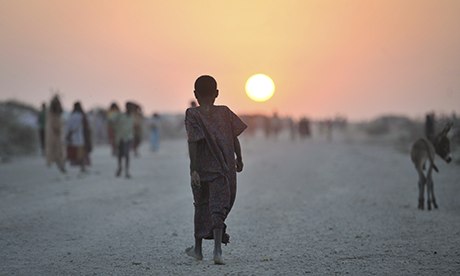
If given a safe environment and platform to assert themselves, girls will lead the fight to overcome breast ironing. Photograph: Tobin Jones/AFP/Getty Images
Elizabeth Mbu kept her secret for 16 years. Aged 11, her mother kneaded her naked, developing breasts with a hot stone twice a week to stop them growing. "Each time I cried as it was really painful," she says. "I didn't understand what was going on, but it was very difficult to speak about." Her mother continued the practice for a year, causing permanent damage.
Now aged 29, Elizabeth is a member of Came women and girls development organisation (Came W&G), which encourages girls to advocate against the practice of breast ironing in Cameroon. Research from 2006 suggests it affects 24% of Cameroonian girls as young as nine. Yet the practice is a closely guarded secret between mothers and daughters. "Mothers say it's normal to do it, because it prevents the girl getting pregnant early and dropping out of school, or being raped," explains Elizabeth. "When they see their girl growing breasts, they think they will attract boys – they are protecting their girls."
Mothers' concerns about teenage pregnancy are not unfounded. A UN Population Fund report found 30% of girls in Cameroon aged 20 to 24 surveyed in 2010 had given birth before they were 18. Only 39% enrol in secondary education.
Came W&G focuses on empowering girls to break their silence. Elizabeth and others organise community meetings in the capital Yaoundé, where they share their physical and mental traumas. The group lobbies traditional leaders and government representatives for change, and carries out door-knocking to persuade mothers and young victims. "It's not an easy thing to talk about publicly," says Elizabeth. "At the beginning I was nervous and cried. Girls are afraid to talk because of how people will see them or talk about their parents. But when they see you explaining your situation they get courage."
Breast-ironing victim Nchang Kazua, 28, campaigns for Came W&G in Bamenda. "Mothers are often bitter about us telling them it's bad because they think it's traditional," she explains. "The girls' testimonies can convince them of the future damage the action will cause." As well as scarring from burning-hot stones or pestles, women report problems with breastfeeding and a loss of confidence.
Came W&G's chair Margaret Nyuydzewira says mobilising younger generations is key to ending breast ironing. She wants to break into the women's associations common in Cameroonian society that help spread the practice. "We need to empower young girls to talk, advocate and sensitise the mothers, as well as traditional leaders to make laws banning breast ironing," she says.
Nyuydzewira wants to set up groups in Cameroon's 10 regions. She needs more funding to deliver advocacy training, but finds it hard to gain support. Nyuydzewira compares the situation to progress on female genital mutilation (FGM). "Look at the resources now committed for FGM – but is still has a long way to go," she says. "With breast ironing we have not even started yet. I tell the girls – you are not going to see results now, but as you keep talking things will change."
Came W&G is one of few organisations challenging breast ironing in Cameroon. Plan International works with girls on other advocacy projects. Its local PR and communication advisor Jaire Moutcheu says girls speaking publicly about issues such as early childhood marriage and rape have a strong impact. "It's down to those girls' testimonies that we were able to reinforce our relationship with the ministry of women's empowerment and family last year," she says. Following an event to mark the International Day of the Girl Child in 2012, the Cameroonian government department signed a joint action agreement with Plan. "The testimonies enabled them to understand that our work in the field is concrete," says Moutcheu.
She advises other NGOs to talk through girls' testimonies with them in detail before public events, and also to gain parental consent and arrange meetings with rights advisors and psycho-social support workers.
The youth outreach programme also focuses on empowering Cameroonian girls. Partnered with charity VSO, it provides civic education and mentoring to encourage women's participation. Programme officer Patience Agwenjang says parents can hinder girl's participation in such programmes. "They fear they will become rebels," she says. "Most of the girls receive insults or intimidation while carrying out public engagements." However, Agwenjang says by continuing the training, girls improve their communication skills and can assert themselves.
One mother says Came W&G's young advocates have already convinced her. "When I found out breast ironing was wrong, I told my daughter I was trying to do the right thing," says Magdalen Obi from Mutengene, who joined Came W&G as a result. "She understood and is not angry with me." Mother and daughter now share their story with other women by giving talks to local organisations and groups. "We tell them this is the wrong thing to do," she says.
#theguardian
#Gabriella Jozwiak is a freelance journalist specialising in issues affecting children and young people. She is the Africa programmes support volunteer at Y Care International. Follow @GabriellaJ on Twitter
No comments:
Post a Comment
Tell Us Your Views